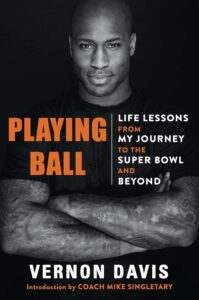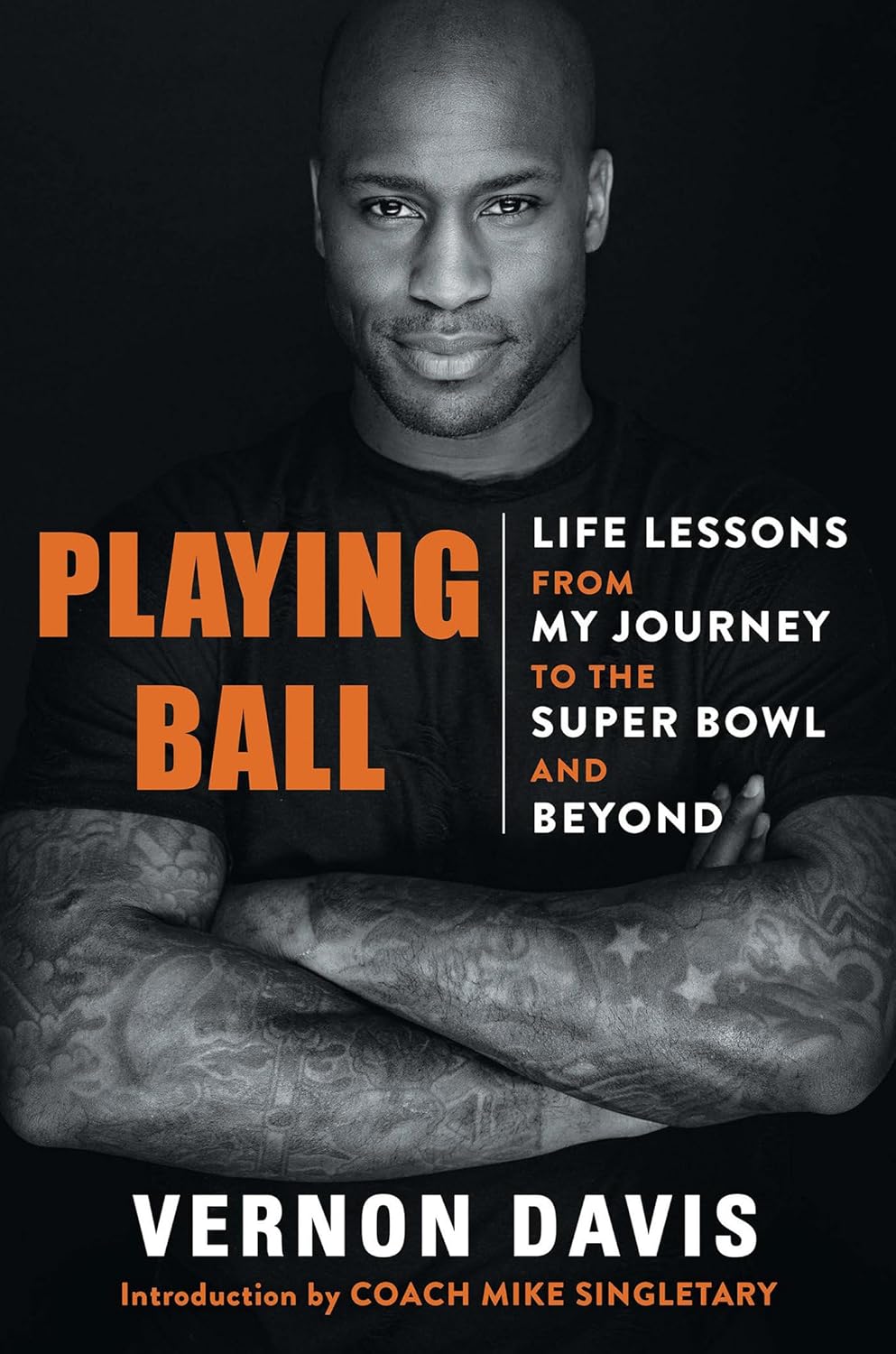Before and after the Super Bowl
An autobiography by football great, former Bronco Vernon Davis
An autobiography by football great, former Bronco Vernon Davis
Ask fans of professional football what they know about Vernon Davis, and they will most likely mention his prowess as a fast, talented tight end who played for the San Francisco 49ers, was a two-time Pro Bowler, won a thrilling Super Bowl as a member of the Denver Broncos, and ended his sports career in 2020 when he retired from the Washington Redskins.
Ask fans of TV and movies what they know about Davis, and they might mention him acting in or producing dozens of movies, competing on Dancing with the Stars, and hosting TV game shows, reality and reunion shows.
Davis is all those things, as well as an entrepreneur who owns restaurants, is part-owner of a women’s professional soccer team, works in commercial real estate and runs a foundation that focuses on helping disadvantaged children.
 If his professional resume doesn’t make it clear, Davis has led a life that is defined by setting goals and achieving them. So, when he asked himself if he could write a book, the answer was obvious. Of course, he could. The result: Playing Ball: Life Lessons from My Journey to the Super Bowl and Beyond.
If his professional resume doesn’t make it clear, Davis has led a life that is defined by setting goals and achieving them. So, when he asked himself if he could write a book, the answer was obvious. Of course, he could. The result: Playing Ball: Life Lessons from My Journey to the Super Bowl and Beyond.
“Having a book published allows you to lock it all in, the things you were thinking, doing and going through throughout your life and career,” he writes. “In a way, writing a book would be, like, a special gift to myself to remember it all, the journey that I’ve taken.”
Davis’s journey began in Washington, D.C. He was the oldest of seven children, three boys and four girls who were raised by their grandmother, Adaline, and grandfather, Lynwood. His mother, Jacqueline, struggled with addiction for most of her life. “My mother was on crack during the heavy drug years of the 1980s and ‘90s,” he writes. “Drugs were everywhere in DC back then, and she struggled with a crack cocaine addiction like thousands of other people in the District.”
By the time he was a fifth-grader, Davis writes, “I was a wild boy on those streets. Or at least I thought I was. At the time, I thought that getting into trouble was what made you cool. So, if you met me between my fifth and seventh grade years, you probably would’ve said, ‘That kid isn’t going to make it. He’s gonna end up dead.’”
Davis roamed the neighborhoods of D.C. with his friends, stealing bicycles and puppies out of yards to resell. He was arrested twice, but by seventh grade, he writes that he decided to change his life. “I wanted to stop those embarrassing and defiant years, where I made one bad decision after another, hurting my grandmother and the rest of the family.”
Davis turned to sports, excelling at basketball. By the eighth grade, he was 6’2”, fast and strong. When he reached high school, at 6’3” and 205 pounds, he decided to give football a try. He was given the tight end position, and he also was on the track team. “I loved it!” he writes. “I loved everything about competing. I just knew that in order to be great at what I wanted to do, I had to do more than just play football.”
That thought carried Davis through high school, into college at the University of Maryland, and further into the NFL, where he was selected sixth overall in the first round of the 2006 NFL draft by the San Francisco 49ers.
His tenure with the 49ers under Coach Mike Singletary included a memorable player-coach interaction that is still talked about today and is memorialized in YouTube videos.
The 49ers were playing the Seahawks, and Davis was given an unnecessary roughness penalty for hitting an opposing player in the face mask. Davis had words for the referee who called the penalty, and then more words for his coach. Finally, the coach sent Davis to the locker room. That very public humiliation and a post-game press conference—both played out on national TV where Singletary called him out again—was a turning point for him, Davis writes. “Sometimes, you need a kick in the ass to shake up what you’ve been doing that hasn’t been working.”
That moment remains important to Davis, he writes; so important that the first 14 pages of his book are an introduction written by his former coach. The coach ends his introduction with these words: “Vernon Davis heard my message, and he took action to make the necessary changes that improved his life. And for that, I am so tremendously proud of him.”
Davis ends his memoir with his dream of being inducted into the Pro Football Hall of Fame. “I hope to be one of the next players the football fans bring up in their Hall of Fame conversation in the future. After such a long journey and football career, I learned that life is about much more than me. It’s about helping others and inspiring people to be the best versions of themselves.”
Deb Acord is a journalist and author from Woodland Park, Colorado. For decades, she wrote for The Colorado Springs Gazette, Rocky Mountain News, Denver Post and The Indy. At the Gazette, she was co-creator of Out There, a section devoted to the outdoors of Colorado. She is the author of Colorado Winter and Biking Colorado’s Front Range Superguide and has writtten car trend stories and environmental stories for Popular Mechanics.
Click here for more from Deb Acord.

